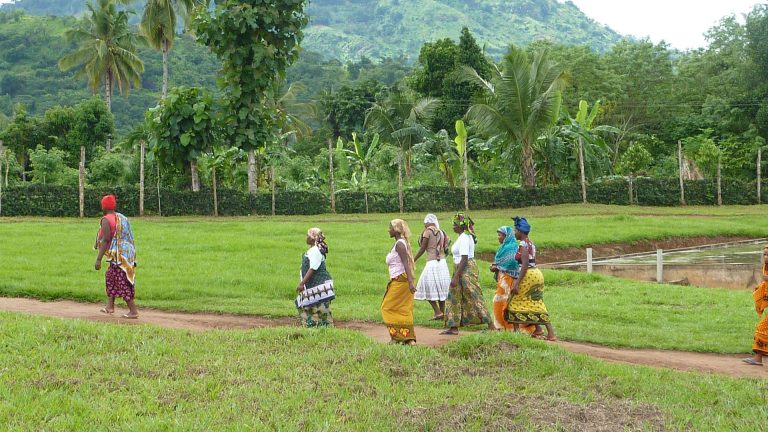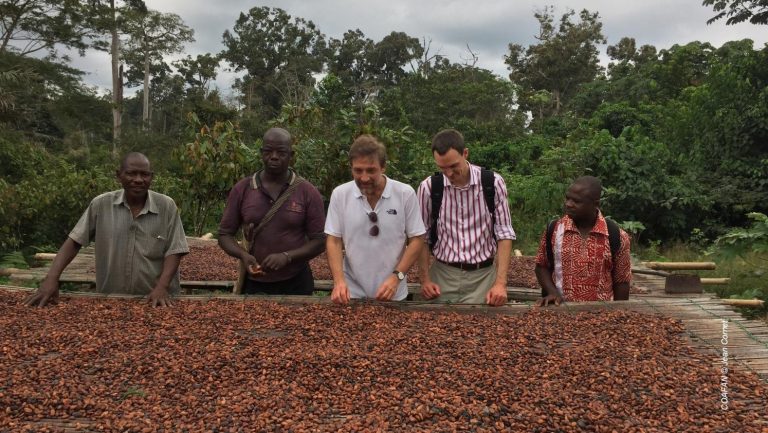We worked on prospecting and sales pitches for the most profitable segment, i.e. organic mangoes exported abroad. Two additional cooperatives had been Fairtrade certified and everyone was continuing their efforts
Benoit Fiévez Tweet
In Yanfolila, southern Mali, USCPY, a union of nine mango cooperatives, was supported by two coaches from the Trade for Development Centre. The work carried out over the three years of the intervention is impressive. Professionalisation of the cooperatives, increased production and sales, and the retention of both members and customers… Their coaches detail the progress made.

USCPY, for Union des Sociétés Coopératives des Planteurs de Yanfolila, is an umbrella union of mango producer cooperatives located in the village of Yanfolila, in the south of Mali on the border with Guinea. In total, USCPY and its nine cooperatives represent nearly 1300 families.
In Yanfolila, 20% of the mangoes are consumed locally. “These are approximate figures, but it is important to remember that mangoes tide them over, i.e. they enable the population to feed itself between two annual maize harvests. The earliest mangoes reach maturity around March or April,” explains Benoit Fiévez, a coach who supported the USCPY with their marketing between 2016 and 2019.
Looking for customers
This leaves more or less 80% of mango production to be sold. How does the cooperative do it? “The security situation is not necessarily simple in Mali. Even if the South is spared, in the North, Islamic terrorism complicates trade. USCPY’s customers were Algerian importers who were transiting through the North and are now blocked. We therefore had to find other customers”, Benoit explains. This was also confirmed by Cheick Fanta Madi Sidibe, treasurer of the USCPY.
At the time, the situation was not straightforward. A new board of directors (CA) had just been appointed, but the previous one took all the data and knowledge with it: “This was the first governance problem identified: the CA was new and inexperienced, made of people who owned a few hectares of mangoes. Of the seven, five could neither read nor write. Two members spoke French and it was through them that we wera able to communicate with each other”. There was no time to dwell on the past: “We had to move forward”.
In January 2016, Benoît set out fis first mission to tackle a clearly identified problem: “There was a problem with slump. The USCPY was only selling ⅓ of its production, the ⅔ were rotting in the field”. Together, they decided that the priority was to increase sales. With the help of an agronomist, they managed to get a more or less precise idea of the quantity of mangoes available. “The second step was to understand why not everything was sold, because up until 2012, the USCPY was managing to sell all its production,” says Benoît.
The factory opposite
“What happened in 2012? The road between Yanfolila and Bamako was asphalted, and a mango processing plant was built in Yanfolila. USCPY’s regular customers thought that the union was selling all its production to this plant. But… this was not the case!” The cooperatives didn’t dare to contact the plant or offer them the mangoes. This had to be sorted out quickly. An appointment was set up between the USCPY and this neighbouring factory, “I even think we met them the same day”, recalls Benoît. “And it turned out that the factory was struggling to buy enough mangoes!”. Part of the production could therefore be sold to the factory.

But for the remaining production, the mangoes that matures later (during the rainy season), this always posed a logistical problem. “Because in the downpours it was impossible to go and pick them up by lorry. So we brought the agronomist back, who explained that we could change the variety of mangoes without changing the plants, using the grafting technique. It took a season to adapt, but it was a success!”
Increasing prices and sales in one season
Once these initial problems had been resolved, USCPY was already planning the next step: “With this first mission, wa had already begun ti expand the customer portfolio. The Malian Ministry had drawn up a list of forty exporters. I had proposed to the Board of Directors to contact three customers”. Three months later, the members had contacted fifty! “It was a huge task, they had spoken to the entire export and processing market, and hade event met some contacts directly”. This led to purchasing agreements with six new customers.
Now they needed to define the product portfolio: “The cooperative came to the conclusion that it had to deal with large volumes, 30,000 tonnes of fresh mangoes, part organic and Fairtrade, part conventional, and that it didn’t have time to deal with 18 litres of juice or 22 kilos of dried mangoes”. The members and their coach are also working on the price, which they were raising. First conclusions: “In 2015, 10,000 tonnes had been sold and 20,000 had rotted in the field. In 2016, there were already only 8,000 tonnes unsold and the average price had risen by 6.5%”, Benoît is pleased to report. “In 2017, new estimates showed that most of the remaining unsold mangoes were in fact not thrown away, rather they were consumed by the producers themselves, which is very reassuring!”.
Lack of management tools
In 2017, work focused on building customer loyalty: “We worked on prospecting and sales pitches for the most profitable segment, i.e. organic mangoes exported abroad. Two additional cooperatives had been Fairtrade certified and everyone was continuing their efforts”, summed up Benoît at the end of the mission… That season, the USCPY forgot to get back in touch with a customer in advance of the upcoming season, which made the Union understand that it needed a file for each customer so that it wouldn’t forget anyone from one season to the next.
It was at this time that Joé Toho took over the coaching. Joé Toho is based in Benin where he is an independent consultant: “Together with the USCPY, we started carrying out organisational and financial analysis to see what the problems were. We realised that we needed to draw up a schedule to prioritise the actions to be carried out in the short, medium and long term,” says Joé Toho. Among the most urgent problems: the famous management tools. “The USCPY had no tools for planning, monitoring and evaluating production, nor did it have a balance sheet, accounting management to ensure the traceability of expenditure and income, or a provisional budget,” Joé explains.
Surround yourself with the right people
“There used to be tools, but they were set up by the technical minds at Helvetas, a Swiss NGO. Once the Helvetas project was over, there was no one left to ensure continuity or to centralise information,” Joé recalls. In 2018, the USCPY had sufficient resources to directly recruit the former Helvetas technical consultant, who was still working in the region : “He became the permanent secretary of the Union. He takes care of the coordination”, Joé is pleased to say.
In addition, the skills that treasurer Cheick Fanta Madi Sidibe needed for the “day-to-day operations” were strengthened. “My goal was to keep the old clients while managing to attract new ones, both nationally and internationally,” he sums up. His role is fundamental for the runninf of the USCPY: “It is the treasurer who ensures tha ccounts are all in order. Together we designed what we call a cash book that records expenses and income, as well as a bank book. We also thought about how to draw up a provisional budget. It is the elected representatives of the cooperatives who must be able to ensure traceability and enter the correct information into the tools. They have to be able to monitor whether the accounts are accurate”, Joé explains.

The USCPY, with Joé’s help, has set up sheets for each sales campaign: “We designed a very simple sheet that lists the initial objectives and the qualitative and quantitative levels of achievement, making it possible to see the gaps between objectives and results achieved. This allows USCPY to justify them, draw lessons per cooperative and make its own assessment,” says Joé. “These self-reflection exercises really enabled each cooperative to improve for the next campaign”.
Motivating members
Another issue identified as early as 2017 was member retention: “USCPY wanted to facilitate member buy-in to the initiatives. The aim was to increase the share of production that members pass through the cooperative circuit, and also to foster the spirit of membership”, summarises Joé.
To this end, Joé proposed to USCPY to organise “focus groups” with the producers themselves: “USCPY invited the members of the executive boards of the various cooperatives. It was very lively, with everyone engaged, and the union being able to benefit from these views wal a real lifeline. There was a real enthusiam at the time and they were able to capitalise on the proposals, which brought about the change the wanted: the members were previously selling less than 50% of their production through the Union, and since the process, this figure has risen to 79%! It’s not 100% yet, but it’s a substantial increase,” Joé says happily.
A groundbreaking programme that has proved its worth with the USCPY
“It’s the very principle of coaching,” concludes Joé, “It’s all down to them! I was only there to facilitate and coordinate”. Benoît agrees: “Whan it comes to international cooperation, this Enabel programme is really groundbreaking. Everyone here is a mango producer. By increasing the income of the producers (1300 dollars per year, which is enormous given the average income in the region), more girls have been able to attend school”.
Benoît thinks this story should be told far and wide: “For the missions I have done, it is quite rare to see such isolated communities, with almost a monoculture, getting such clear results. The Trade Development Centre’s (TDC) coaching programme is straightforward and pragmatic, and it works. Everyone should know about it”
Interview by Charline Cauchie
Read also

TDC’s coaching program
TDC’s coaching program Backed by our long experience in financing producers’ organisations, we realised that they often had a lot of potential, but lacked knowledge

COOPAKE: mangoes, sesame, cashew nuts and hibiscus from Burkina Faso
Founded in 1963, COOPAKE, one of the oldest cooperatives in Burkina Faso, was born out of the desire of nine small mango producers in the west of the country to better sell their crops. However, it only really took off in the 1990s, when it started using ovens to dry mangoes. This processing of the fruit created jobs for dozens of women, but also enabled them to export to Europe.

People approach in the TDC coaching sessions
These cocoa cooperatives aim to sell as much of their members’ cocoa as possible at the best conditions possible. But doing so is far from evident.


